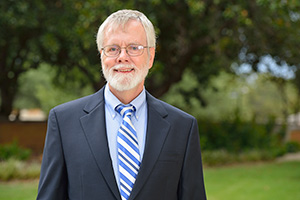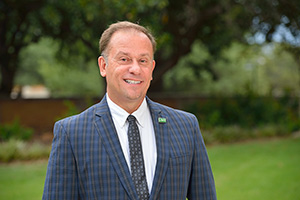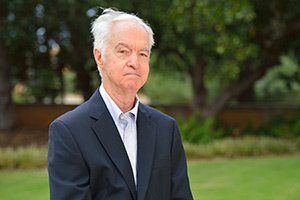 The Miranda rights and warnings -- the right to remain silent, anything you say can and will be used against you in court, the right to an attorney, and so on -- are simple and easy to understand, right?
The Miranda rights and warnings -- the right to remain silent, anything you say can and will be used against you in court, the right to an attorney, and so on -- are simple and easy to understand, right?
Not necessarily, says Richard Rogers, Regents Professor of psychology.
Rogers has studied the Miranda rights and their use across the country for more than a decade. Over that time, Rogers has found that some of the warnings used to inform defendants of their rights may instead confuse them, especially juveniles.
"There are so many different versions of it with even some of them written at a college or post-college level," says Rogers. "Thousands of defendants give up their rights with a poor understanding of what those rights are, and often, profoundly mistaken beliefs."
His research and discovery prompted the American Bar Association to call for clear and concise Miranda language for juveniles across the country. His latest work, Mirandized Statements, a book by Rogers and Eric Drogin, a legal scholar and forensic psychologist at the Harvard Medical School, offers valuable tools to help defense attorneys and prosecutors alike build the strongest cases possible and to help the judges weigh the arguments about whether to suppress a Mirandized confession.
Awarding excellence
 Because of his work, Rogers will receive the UNT Foundation Eminent Faculty Award during the Salute to Faculty Excellence Awards Dinner and Celebration, a black-tie event Sept. 26 at Apogee Stadium.
Because of his work, Rogers will receive the UNT Foundation Eminent Faculty Award during the Salute to Faculty Excellence Awards Dinner and Celebration, a black-tie event Sept. 26 at Apogee Stadium.
In addition to the distinction of "eminent faculty" Rogers will receive $15,000 and a commemorative engraved gift.
Also at the event, Mark Vosvick, associate professor of psychology will receive the foundation's Faculty Leadership Award, and Stanley R. Ingman, a professor in the College of Public Affairs and Community Service, will receive the foundation's Faculty Community Engagement Award.
Those winners receive $5,000 and engraved commemorative gifts.
More than 30 other awards will be given for research, teaching and service.
A better research culture
 Rogers joined the UNT faculty in 1991. At the time, his forensic psychology research focused on the assessment of malingering and the study of competency to stand trial. He says the support at UNT has helped him build national recognition among researchers at top-tiered universities.
Rogers joined the UNT faculty in 1991. At the time, his forensic psychology research focused on the assessment of malingering and the study of competency to stand trial. He says the support at UNT has helped him build national recognition among researchers at top-tiered universities.
"In the last decade, the culture of UNT has changed dramatically," Rogers says. "Research was always considered important, but the leadership here has taken steps to make it more valued and supported. I have experienced a renewed energy and focus because of these efforts."
Leading to leave a legacy
Vosvick is the director for UNT's Center for Psychosocial Health Research and co-director of the LGBT Studies Program at UNT.
He played a key role in the acquisition of the archives of the Resource Center Dallas that trace 60 years of the history of the lesbian, gay, bisexual and transgender social movements in the North Texas region.
The collection includes documents, letters and articles as well as artifacts like a T-shirt from the 1979 National March in Washington for Lesbian and Gay Rights. Acquiring the collection after years of negotiating was significant, Vosvick says, because they will help scholars study how the experience of the LGBT community was different in the south than it was in the east or west.
His role in acquiring the collection fell outside a traditional faculty role, he says, but preserving that source material was important.
"I think that inspires folks to think about the role of faculty outside of traditional scholarship." Vosvick says. "We were able to make valuable materials available for the next couple generations of scholars."
More about our Salute to Faculty Excellence
- Learn more about faculty awards and recognition
- See all the award winners
- Watch a video with Richard Rogers, UNT Foundation Eminent Faculty Award Winner
He served as chair of the UNT Faculty Senate from 2012 to 2014 and as vice chair from 2010-2012. In that time he sought to strengthen the senate's voice by encouraging senators to embrace their roles as representatives and actively seek input from all their constituents. As part of the senate, he led the formation of the Committee on the Status of LGBT Faculty.
Serving to find solutions
Ingman, the former director of the UNT Center for Public Service, joined UNT in 1990 and has worked on community projects in the Denton and Dallas areas. His programs for public housing, building sustainable neighborhoods, afterschool care, senior adult care and preschool immunization have received several national grants. As a principal investigator for more than two dozen studies, Ingman has received approximately $6 million in research funding.
He also has seen some of those projects as the basis to develop sustainable neighborhoods and businesses in Mexico. It has also led to the formation of two schools where children learn to make their own neighborhoods thrive.
Ingman has seen the threads that tie those projects together and the students who, by their involvement, have developed more complete perspectives of the world around them.
Since he came to UNT, he's been encouraged to see an increased emphasis on community engagement.
"Universities can no longer be off the hook for ignoring the environmental ills around their cities and states and branching out into the rest of the world," Ingman says. "In order to be relevant in the modern age, they need to develop a thoughtful and reflective approach in solving these problems."


